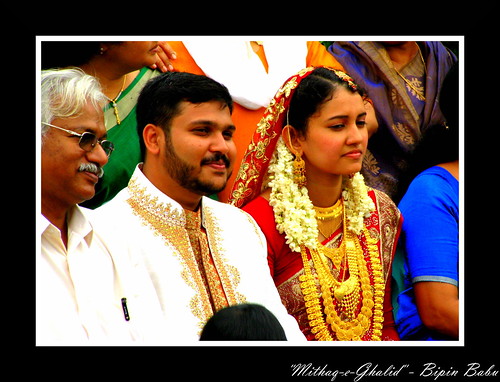By Md. Ali, TwoCircles.net,
This is the first part of three part series on the Kerala Muslim Marriage and Dissolution by Talaq (Regulation) Bill. The other two parts will deal with the kind of reaction that the Bill has evoked in the Muslim community.
In a progressive and bold step towards the reform of Muslim Personal Law, the Kerala Law Reforms Commission has drafted a bill which will curb and check the practices of polygamy and divorce through Talaq among Muslims in the state.
The bill titled as the Kerala Muslim Marriage and Dissolution by Talaq (Regulation) Bill seeks to “declare that, among the Muslims in Kerala, monogamy is the general rule and polygamy a just exception, permissible only in socially exceptional circumstances and that also subject to compassionate conditions, and to provide further that divorce by talaq can be effected only subject to special conditions.”

Photo by Bipin Babu
The bill which has been drafted by the Commission led by the noted jurist and former Supreme Court lawyer Justice VR Krishna Iyer also declares that “if any married Muslim, man or woman, marries again during the subsistence of the first marriage, the party who violates shall be guilty of bigamy under the Indian Penal Code and punishable as such.”
As per the Bill ‘marrying again during the lifetime of husband or wife is an offence.’
The Bill has been drafted by the commission after the observation of the Kerala High court on the issue of polygamy and divorce among Muslims.
On October 22, 2008 the High Court bench of Justices Kurian Joseph and Harun-ul-Rasheed expressed an urgent need to supervise and regulate Muslim marriages and divorces.
The Bench suggested the government to set up institutions and official bodies both at the state and regional levels (‘conciliation councils’) to take into account the indiscreet marriages and divorces.
The court did accept that polygamy was allowed by Quran but it also pointed out that the permission for polygamy was provided in a completely different historical context when there used to be many orphans and widows because of the wars.
As far as the practice of polygamy in India is concerned, it further said, the fact is that there is no mechanism to supervise or regulate indiscreet marriages and divorces which go virtually unaccountable and which ultimately create many problems and pathetic conditions for the helpless and destitute women and children.
Although the Bill seeks to restrict polygamy it does leave some space for the provision of second marriage by the husband albeit only “with the (wife’s) consent in writing before a notary public or a judicial officer expressing her consent to the second marriage and briefly giving her reasons for the consent.”
But in this case the husband seeking remarriage “shall be liable to provide reasonable accommodation and privacy as well as just alimony or maintenance sufficient for the wife to sustain herself in reasonable comfort.”
If the proposed law is passed by the state legislature then it would be mandatory for the Muslims in the state to register their marriages and divorces with the local registrar of marriages.
The proposed law provides for the provision of setting up a “conciliation council” in each district to regulate and supervise the cases of marriage and divorces of the Muslims in the state.
The conciliation council of every district will be headed by a retired Muslim Judge or magistrate, as proposed by the bill.
Affirming the Islamic idea the Kerala Muslim Marriage and Dissolution by Talaq (Regulation) Bill also considers the marriage of the Muslims as a “contract”.
Talking about divorce the proposed law says that “the female spouse shall be entitled to divorce only through court or with the approval of the conciliation council on grounds of irretrievable breakdown irreparable by conciliation.”
The bill has an interesting feature which is the idea of compromise divorce. As per the Bill if “both spouses enter into a compromise sanctioning divorce on the ground of irretrievable breakdown and such agreement is attested” by a judicial officer, a competent court may grant divorce “without further forensic procedure.”
The Commission has sent the draft to the legal luminaries of the Muslim community in the state for their opinion and suggestions. The draft of the Bill will be submitted to the government soon.

